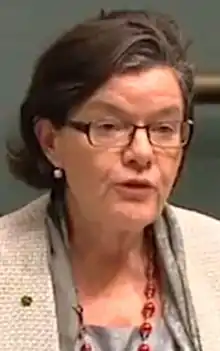| Commission overview | |
|---|---|
| Formed | 1 July 2023 |
| Preceding Commission | |
| Jurisdiction | Australian Government |
| Headquarters | Canberra, Australian Capital Territory |
| Employees | 180 (July 2023)[1] |
| Minister responsible | |
| Commission executives |
|
| Website | www |
| Governing legislation | National Anti-Corruption Commission Act 2022 (Cth) |
The National Anti-Corruption Commission, often shortened to the NACC, is an independent federal Australian Government agency that was created under the National Anti-Corruption Commission Act 2022.[2][3] The commission is designed to combat corrupt conduct from public officials employed in the Australian Public Service (APS), including politicans and bureaucrats. It was established on 1 July 2023, and replaced the Australian Commission for Law Enforcement Integrity (ACLEI).
History
Greens leader Bob Brown called on the Rudd government in 2009 to establish an integrity commission.[4] Over the decade since 2012, Australia's score in the Corruption Perceptions Index from Transparency International has slipped from 7th place in 2012 to 18th in 2022.[5] There is a public perception that corruption in Australia is increasing.[6] Although every state in Australia had its own anti-corruption agency as of 2017, calls for a federal anti-corruption agency were ignored. Existing federal agencies that have anti-corruption as part of their remit include the Australian Commission for Law Enforcement Integrity (ACLEI), the Australian Federal Police (AFP), the Australian Public Service Commission (APSC), the Commonwealth Ombudsman and the Australian National Audit Office.[7] In 2017, a parliamentary committee reported on the establishment of a national integrity commission.[8] As of 2019, the Labor proposal for a National Integrity Commission does not define corrupt conduct or include a threshold for investigation.[4] In June 2022, the Attorney-General, Mark Dreyfus, advertised roles in the NACC taskforce.[9]
Coalition proposal
In January 2018, Australian Labor Party (ALP) leader Bill Shorten pledged to establish a national integrity commission if elected.[10] Despite earlier dismissing the idea as a "fringe issue", in December 2018, prime minister Scott Morrison promised to establish an anti-corruption body if the Liberal-National Coalition won the 2019 election.[11] The previous August, Griffith University researchers had laid out a plan for a Commonwealth Integrity Commission,[12] and Attorney-General Christian Porter had been working on adapting the Australian Commission for Law Enforcement Integrity into an anti-corruption watchdog in the Turnbull government.[11] The framework was criticised for its narrow remit and the decision not to allow public hearings, and not being allowed to take tip-offs, as well as the high burden of proof needed before an investigation can take place.[13] Additionally, ministers would have to agree to allow an investigation into anything they were engaged with.[14] The Morrison government was critical of the NSW ICAC model. The Morrison government model also did not give the CIC power to address "grey corruption" such as lobbying, bribery, political donations and the "revolving door".[15] The Morrison government tabled an exposure draft,[16] but insisted that Labor would have to support it before the government brought it to a vote. The CIC was not part of the Morrison government's agenda during the 2022 election campaign.[17]
Cathy McGowan proposal
Senator Larissa Waters amended a plan by former member for Indi Cathy McGowan which passed the Senate in 2018, refining the meaning of corrupt conduct and limiting the retrospective powers of a federal integrity body to 10 years.[18] It was allowed to lapse in April 2022.[19]
A bill produced by Independent member for Indi Helen Haines to introduce a federal anti-corruption body was blocked in Parliament by the Coalition in November 2021. Liberal MP Bridget Archer crossed the floor to support it.[20] By the time Haines introduced the bill, it had been refined by consultation with legal academics, panels of retired judges, civil society stakeholders, ethicists and MPs.[21] It was allowed to lapse in April 2022.[22] Labor said that it would draw on Haines' bill to inform its legislation,[23] however the NACC has significant differences from Haines' bill.[24]
Introduction into Parliament
Anthony Albanese led the Labor Party to victory in the 2022 federal election with an election promise to establish an anti-corruption watchdog.[25] On 28 September 2022, the Albanese government introduced the National Anti-Corruption Commission Bill 2022 and National Anti-Corruption Commission (Consequential and Transitional Provisions) Bill 2022 to parliament. The introduction of the bills was delayed by the death of Queen Elizabeth II three weeks prior. Crossbenchers have proposed that the scope of the NACC should extend to being able to investigate third parties getting in touch with politicians.[26] The bills to establish the National Anti-Corruption Commission passed the House of Representatives on 24 November 2022; they passed the Senate on 29 November 2022 after crossbench amendments were either withdrawn or defeated.[2] On 12 December 2022, the bills received royal assent, and the NACC began operations on 1 July 2023.[27] The commission received 44 referrals of corrupt conduct in its first two days of operation.[28]
Organisational structure
The NACC is led by a Commissioner, three Deputy Commissioners and a Chief Executive Officer. The inaugural Commissioner is Paul Brereton. One of the three Deputy Commissioners is Jaala Hinchcliffe, the Integrity Commissioner and head of the Australian Commission for Law Enforcement Integrity until the latter was absorbed into the NACC. Hinchcliffe's appointment as a Deputy Commissioner is temporary until a permanent third Deputy Commissioner is appointed. All other leadership positions have a term of five years.[29]
Powers
The NACC has the power to investigate Commonwealth ministers, public servants, statutory office holders, government agencies, parliamentarians, and personal staff of politicians.[30] Non-government actors will not be covered.[24] It is independent of government, with the power to initiate its own investigations as well as in response to tip-offs from referrals, including whistleblowers and the public.[30]
The NACC is overseen by a statutory bipartisan Joint Standing Committee of the Parliament.[30] It has the power to investigate retrospectively.[30] It also has the power to hold public hearings when it is in the public interest,[30] however, the NACC will hold private hearings by default.[31]
It will not be able to make a finding of criminality.[32] The NACC has the power to investigate pork barrelling.[33][24] It does not have the power to sack parliamentarians.[34]
State anti-corruption commissions
- Independent Commission Against Corruption (New South Wales)
- Independent Broad-based Anti-corruption Commission (Victoria)
- Crime and Corruption Commission (Queensland)
- Independent Commission Against Corruption (South Australia)
- Corruption and Crime Commission (Western Australia)
- Integrity Commission (Tasmania)
- Independent Commissioner Against Corruption (Northern Territory)
See also
References
- ↑ "The Army Major General turned federal anti-corruption boss officially starts today - what's ahead of him?". ABC News. 30 June 2023. Retrieved 1 July 2023.
- 1 2 Karp, Paul (29 November 2022). "'Naccflip': National anti-corruption commission bill passes Senate after Greens backdown". the Guardian. Retrieved 30 November 2022.
- ↑ "National Anti-Corruption Commission could be operating by mid-2023". Australian Financial Review. 8 September 2022. Retrieved 1 December 2022.
- 1 2 "National integrity commission". aph.gov.au.
- ↑ Ward, Tony. "Perceptions of corruption are growing in Australia, and it's costing the economy". The Conversation. Retrieved 22 May 2022.
- ↑ "Corruption in Australia". Retrieved 22 May 2022.
- ↑ Hobbs, Harry; Williams, George (September 2017). "The case for a national whole-of-government anti-corruption body". Alternative Law Journal. 42 (3): 178–183. doi:10.1177/1037969X17730190. hdl:10453/130437. S2CID 149175164.
- ↑ "Select Committee on a National Integrity Commission". aph.gov.au.
- ↑ "Dreyfus advertises for anti-corruption taskforce roles". The Mandarin. 2 June 2022. Retrieved 6 June 2022.
- ↑ "Bill Shorten promises federal anti-corruption watchdog if he wins the next election". Sydney Morning Herald. 30 January 2018.
- 1 2 Remeikis, Amy; Knaus, Christopher (13 December 2018). "Morrison government announces new federal anti-corruption commission". The Guardian. Retrieved 14 December 2018.
- ↑ Knaus, Christopher (21 August 2018). "Overwhelming majority of Australians believe federal politicians are corrupt". The Guardian. Retrieved 14 December 2018.
- ↑ Knaus, Christopher (23 January 2019). "Coalition's plan for anti-corruption body a 'sham' set up to protect MPs, former judge says". The Guardian. Retrieved 23 January 2019.
- ↑ "Federal anti-corruption body to have scope to investigate 'what they see fit', Anthony Albanese says". SBS News. Retrieved 6 June 2022.
- ↑ dela Rama, Marie J.; Lester, Michael E.; Staples, Warren (13 January 2022). "The Challenges of Political Corruption in Australia, the Proposed Commonwealth Integrity Commission Bill (2020) and the Application of the APUNCAC". Laws. 11 (1): 7. doi:10.3390/laws11010007.
- ↑ "Commonwealth Integrity Commission Bill - Exposure Draft". Attorney-General's Department. Retrieved 24 May 2022.
- ↑ "Scott Morrison effectively ditches his promise to establish a federal anti-corruption commission". the Guardian. 13 April 2022. Retrieved 22 May 2022.
- ↑ "Greens push govt on integrity body 'gathering dust'". The Canberra Times. 2 September 2021. Retrieved 24 May 2022.
- ↑ "National Integrity Commission Bill 2018 (No. 2)". aph.gov.au. Parliament of Australia.
- ↑ Bonyhady, Katina Curtis, Nick (25 November 2021). "Liberal MP Bridget Archer crosses floor to back integrity commission". The Sydney Morning Herald. Retrieved 1 April 2022.
{{cite web}}: CS1 maint: multiple names: authors list (link) - ↑ Ng, Yee-Fui. "As the government drags its heels, a better model for a federal integrity commission has emerged". The Conversation. Retrieved 24 May 2022.
- ↑ "Australian Federal Integrity Commission Bill 2021 (No. 2)". aph.gov.au. Parliament of Australia.
- ↑ Ng, Yee-Fui. "What has Labor promised on an integrity commission and can it deliver a federal ICAC by Christmas?". The Conversation. Retrieved 22 May 2022.
- 1 2 3 Brown, A. J. (29 November 2022). "Australia's national anti-corruption agency arrives. Will it stand the test of time?". The Conversation.
- ↑ Murphy, Katharine; Butler, Josh (15 April 2022). "Anthony Albanese commits to anti-corruption watchdog by end of 2022, if Labor wins election". The Guardian. Archived from the original on 16 April 2022. Retrieved 16 April 2022.
- ↑ "Crossbench make 'crucial' demands ahead of release of federal anti-corruption bill". ABC News. 21 September 2022. Retrieved 22 September 2022.
- ↑ "National Anti-Corruption Commission Legislation Attorney-General's Department". Retrieved 11 February 2023.
- ↑ Doran, Matthew (3 July 2023). "More than 40 corruption referrals already made as National Anti-Corruption Commission commences". ABC News. Retrieved 7 July 2023.
- ↑ "Leadership". National Anti-Corruption Commission. Retrieved 1 July 2023.
- 1 2 3 4 5 "Fighting Corruption". alp.org.au. Retrieved 22 May 2022.
- ↑ Griffith University; Transparency International Australia. "Australian anti-corruption commission public hearing powers" (PDF).
- ↑ "'We'll get down to business': Labor's policy agenda awaits Albanese". Australian Financial Review. 22 May 2022.
- ↑ "Albanese government promises national corruption watchdog will have power to investigate pork-barrelling". Guardian Australia. 8 June 2022. Retrieved 12 June 2022.
- ↑ "Mark Dreyfus says integrity bill to 'eliminate corruption' earmarked for next month". SBS News. Australian Associated Press. 12 August 2022. Retrieved 12 August 2022.
Further reading
- "National Anti-Corruption Commission – Attorney-General's Department". ag.gov.au.
- "National Anti-Corruption Commission Bill 2022". aph.gov.au.
- "National Anti-Corruption Commission (Consequential and Transitional Provisions) Bill 2022". aph.gov.au.
- Watson, Geoffrey (2022). "The 'National Anti-Corruption Commission Bill' 2022 – An assessment". Australian Law Journal. 96 (11): 781–786.


